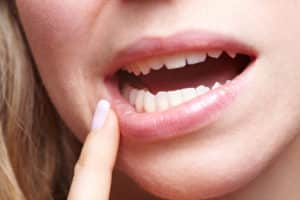Tooth Sensitivity: 1 in 8 Americans Have It


Tooth sensitivity, also called “dentin hypersensitivity”, strikes millions of Americans each year. 1 in 8 Americans have tooth sensitivity, sometimes daily. It’s a condition more common among young people, especially women. While it’s not life-threatening, chronic ache of sensitive teeth can put a serious damper on the quality of a person’s life. Here are some common reasons why our patients get tooth sensitivity and some tips to help prevent and curb that sensitivity!
Tooth Decay: A Common Cause
Most often, tooth sensitivity is caused by a cavity. When you eat, sugar mixes with mouth bacteria and makes plaque. That plaque is very sticky and acidic in nature, and if it sits on your teeth, it erodes the hard outer enamel. Without proper brushing and flossing, you will start to have small cracks and fissures in your teeth. That’s how plaque and bacteria get in.
This leads to many problems with the teeth such as tooth decay and gum disease. Tooth decay is also known as “cavities”, and is a part of a tooth where bacteria and acidic plaque have decayed your enamel. In fact, tooth sensitivity is an indication of hidden tooth decay or internal tooth infection. When it comes on suddenly and gets worse over a few days, it’s likely an infection from decay. Call our office right away when this happens.

Other Causes of Tooth Sensitivity
Don’t panic about a cavity if you’re suddenly having tooth sensitivity, as other common causes happen all the time to our patients. Here are some other reasons why you get tooth sensitivity:
- Winter cold. With changing seasons, we have patients that get a toothache here and there. Cold air hitting the teeth will cause sensitivity for many that can be sudden. Running heat directly in your face in a car or other small space can also irritate your teeth. Patients tend to drink more hot beverages in the winter, which can cause tooth sensitivity as well. You may have a slight bit of gum recession, so some of your tooth along the gum line is exposed to changes in temperature. This can cause aching tooth sensitivity or sudden tooth Limit these habits or try venting the heat more, as well as drinking warm beverages instead of hot ones.
- Gum recession. Plaque and tartar buildup will damage your teeth and irritate your gums. That irritation causes gum recession, which exposes part of your tooth root. This root will be sensitive to hot or cold foods and beverages, which can cause you sharp, sudden pains, as we mentioned.
- Bruxism and TMJ. If you clench or grind your teeth at night, you may wake up with headaches and a toothache in one or more places. We will look to see if you are clenching or grinding or if you need treatment for dysfunction of your temporomandibular joint.
- Tooth injury. A cracked, chipped, or broken tooth will cause tooth sensitivity that is constant, or when it is touched. Come into our office right away if you injure a tooth so that you avoid infection.

Desensitizing Teeth: Some Tips
Everyone gets tooth sensitivity for different reasons. However, there should be some method of pain-relief that will work for you. Our patients generally find relief through:
- Desensitizing toothpaste. There are several brands of toothpaste for sensitive teeth available on the market today. Try brands such as Sensodyne and others that are prescribed for sensitive teeth. Depending on your oral health history, we may want you to use specific brands, or a prescription strength sensitivity toothpaste. Check with our office and see what brands we love and if you need a prescription.
- Use a soft-bristled toothbrush. Many patients don’t realize that there are differences between toothbrushes besides their colors and shapes. However, bristles come in different variations of hardness. Most patients won’t want to brush their teeth with “hard” toothbrushes because the bristles can be too abrasive for the enamel. We recommend that you use “soft” bristled toothbrushes for sensitive teeth, and this will be printed somewhere near the top of your toothbrush container label. This will limit gum irritation, recession, and tooth sensitivity when brushing.
- Avoid highly acidic foods. Acids and sugars will erode tooth enamel much faster than most other types of foods and drinks. Acids are found in citric fruits and drinks, as preservatives, and in sodas and sparkling waters. Your mouth also produces acidic plaque when you eat sugar, so be aware of this. Limit your sugar and acidic food consumption to limit your tooth sensitivity and gum recession.
- Use a fluoridated mouthwash daily. Want stronger teeth? Drink water! Public water sources in the U.S. are enhanced with fluoride, which is a naturally-occurring mineral that acts as a shield for the teeth. You can buy toothpastes, mouthwashes, gels, and rinses that have fluoride added. Use these products, then wait 30 minutes before eating and drinking.
- Avoid teeth grinding. If you know you grind your teeth, call our office for a retainer consultation. Grinding or clenching the jaw at night will wear down and weaken your teeth, causing tooth sensitivity.

Schedule Your Consultation
If you notice sudden tooth sensitivity that is severe, don’t hesitate to call the office. Tooth sensitivity from decay can lead to infection fast. When sensitivity simply comes and goes, try out our desensitizing methods for relief. If you’re still finding yourself with pain and aches from tooth sensitivity, call Dr. Ania’s office today at 303-443-0998 to get your pain under control!


